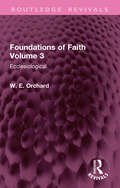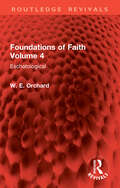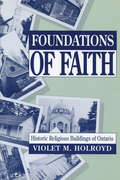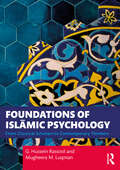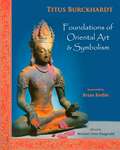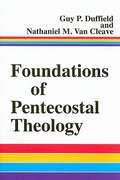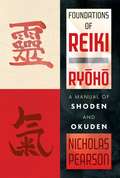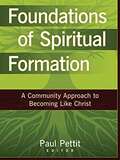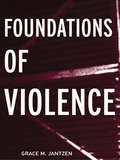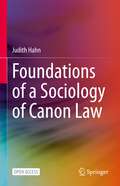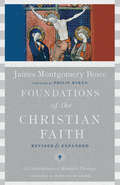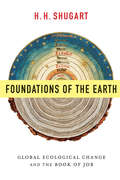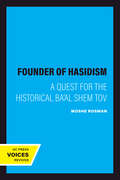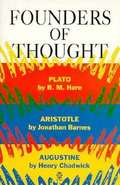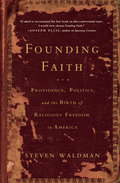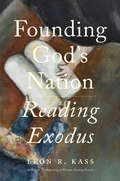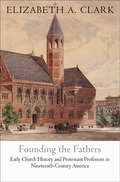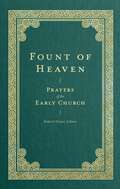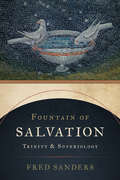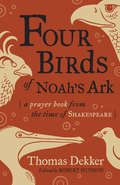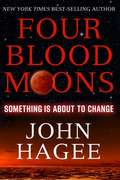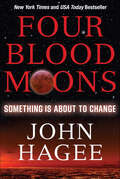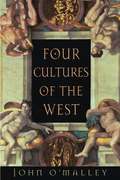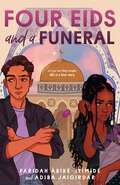- Table View
- List View
Foundations of Faith Volume 3: Ecclesiological (Routledge Revivals)
by W. E. OrchardOriginally published in 1926, this is the third of four volumes to discuss Christian Theology, under the guidance of the historic decisions of the Christian Church and the prevailing tendencies of Catholic thought in the early 20th Century. This volume is concerned with the Church, considering questions of authority and what is meant by ‘Catholic’.
Foundations of Faith Volume 4: Eschatological (Routledge Revivals)
by W. E. OrchardOriginally published in 1927, this is the final of four volumes to discuss Christian Theology, under the guidance of the historic decisions of the Christian Church and the prevailing tendencies of Catholic thought in the early 20th Century. This volume is concerned with subjects that can generally be summed up under the title Eschatology: that part of theology concerned with death, judgements and the final destiny of the soul.
Foundations of Faith: Historic Religious Buildings of Ontario
by Violet M. HolroydThe Ontario landscape is dotted with places of worship, from the simple log cabin to lofty cathedrals. Behind each lie personal stories of exceptional individuals and historical events, all of which have helped shape our lives.The lovers of Anne of Green Gables may be pleasantly surprised by Lucy Maud Montgomery’s long association with the Leaksdale Manse just north of Toronto. From the James Bay lowlands comes an unusual example of ingenuity involving a historic Moose Factory landmark, while the poignant love story involving Florence Nightingale and a local minister is depicted in the attractive stained glass window of a church in Elora. A more recent page of history is captured through the side-by-side relationship of a synagogue and mosque. Throughout, Foundations of Faith will delight the armchair traveller and invite the mobile history buff to explore Ontario.
Foundations of Islāmic Psychology: From Classical Scholars to Contemporary Thinkers
by G. Hussein Rassool Mugheera M. LuqmanFoundations of Islāmic Psychology: From Classical Scholars to Contemporary Thinkers examines the history of Islāmic psychology from the Islāmic Golden age through the early 21st century, giving a thorough look into Islāmic psychology’s origins, Islāmic philosophy and theology, and key developments in Islāmic psychology. In tracing psychology from its origins in early civilisations, ancient philosophy, and religions to the modern discipline of psychology, this book integrates overarching psychological principles and ideas that have shaped the global history of Islāmic psychology. It examines the legacy of psychology from an Islāmic perspective, looking at the contributions of early Islāmic classical scholars and contemporary psychologists, and to introduce how the history of Islāmic philosophy and sciences has contributed to the development of classical and modern Islāmic psychology from its founding to the present. With each chapter covering a key thinker or moment, and also covering the globalisation of psychology, the Islāmisation of knowledge, and the decolonisation of psychology, the work critically evaluates the effects of the globalisation of psychology and its lasting impact on indigenous culture. This book aims to engage and inspire students taking undergraduate and graduate courses on Islāmic psychology, to recognise the power of history in the academic studies of Islāmic psychology, to connect history to the present and the future, and to think critically. It is also ideal reading for researchers and those undertaking continuing professional development in Islāmic psychology, psychotherapy, and counselling.
Foundations of Oriental Art & Symbolism
by Titus BurckhardtThis fascinating edited collection of art historian Titus Burckhardt''s most important writings on Hindu, Buddhist, and Taoist art is lavishly illustrated with 140 superb examples of Oriental art, architecture, statuary, and painting.
Foundations of Pentecostal Theology
by Nathaniel M. Van Cleave Guy P. DuffieldIn this volume, you will find thorough explanations of the fundamental doctrines of the Christian church, presented not as a theory, but as teaching to be believed and practiced. Those doctrines that are considered to be "distinctives" of the Pentecostal movement (Divine healing, the Baptism with the Holy Spirit, and spiritual gifts) are given more extensive treatment. Co-authored by seasoned and trustworthy men who devoted their lives to scholarly study of the Word, systematic teaching, and expository preaching, this book provides an unmatched resource for all who seek to know sound doctrine that can be incorporated into life and ministry.
Foundations of Reiki Ryoho: A Manual of Shoden and Okuden
by Nicholas PearsonA comprehensive guide to the first and second degrees of Usui Reiki Ryoho as well as Reiki’s history and Western evolution • Details hand positions, self-healing exercises, spiritual development meditations, and the Japanese Reiki techniques introduced in the first degree, shoden, and the second degree, okuden • Provides a thorough introduction to the five levels of byosen, the energetic mechanism used to scan an individual’s energy field and locate areas of disharmony • Examines the core teachings of Reiki founder Usui Mikao and offers a new comprehensive exploration of Reiki’s history and evolution • Explores tools and techniques adapted by Western lineages, such as working with crystals and the chakras Bridging Eastern and Western lineages to reclaim Reiki’s roots as both a healing art and a spiritual practice, Nicholas Pearson offers a new comprehensive exploration of Reiki’s history and evolution, the foundations of Usui Reiki Ryoho theory and practice, and the original techniques and modern tools of both the first degree, shoden, and second degree, okuden. He explores the etymology of key Reiki terminology and presents a complete discussion of the origins of the symbols used in the second degree, providing new historical, cultural, and spiritual context. He examines the core teachings of Reiki founder Usui Mikao, who taught that Reiki Ryoho enacted healing at the soul level, as well as insights from other important Reiki masters such as Hawayo Takata. Explaining what Reiki is and how it heals, the author outlines the six core characteristics that all varieties of Reiki share, including initiations and the Five Precepts. He details effective hand positions, self-healing exercises, spiritual development meditations, and the Japanese Reiki techniques introduced in first degree and second degree practice. He also explores a number of other techniques that have been adapted by Western lineages, such as aura sweeping, chakra tune-ups, and charging and programming crystals with Reiki. He provides a thorough introduction to the five levels of byosen, the energetic mechanism used to scan an individual’s energy field and locate areas of disharmony, allowing you to increase your ability to sense centers of toxic imbalance as well as begin dislodging them, thereby increasing the effectiveness of Reiki treatment. Offering Reiki tools to transform your life from the inside out, Pearson shows how Reiki Ryoho is a healing system that focuses on the inner and spiritual aspects of your being first, allowing you to polish the heart so it reflects the shining light of the soul.
Foundations of Spiritual Formation: A Community Approach to Becoming Like Christ
by Paul PettitFoundations of Spiritual Formation takes a unique approach to its subject, arguing that we become like Christ in the context of authentic, Christian community. Without undermining individual Bible study, private prayer, and meditation, the authors emphasize these pursuits for the purpose of both personal and community enrichment-that the whole body, as well as the individual, may be built up. <p><p> Part 1 lays the groundwork of spiritual formation. Jonathan Morrow develops a distinctively evangelical theology, while Richard Averbeck writes about worship. Then Gordon Johnston and Darrell Bock delve into the text of Scripture, grounding the pursuit of spiritual formation in revealed truth. <p><p> Part 2 focuses on functional aspects of spiritual formation. Klaus Issler emphasizes the importance of the heart in spiritual formation, while Reid Kisling illustrates the vital connection between character development and spiritual formation. Bill Miller explores love's role as the motivation for spiritual formation. Andrew Seidel examines servant leadership, and George Hillman extends the discussion to include the significance of calling. Gail Seidel discusses personal narrative as a catalyst for spiritual formation, and in closing, Harry Shields advocates the public preaching of the Word as a tool for spiritual formation.
Foundations of Violence (Death and the Displacement of Beauty)
by Grace M. Jantzen Grace M JantzenThe pursuit of death and the love of death has characterized Western culture from Homeric times through centuries of Christianity, taking particular deadly shapes in Western postmodernity. This necrophilia shows itself in destruction and violence, in a focus on other worlds and degradation of this one, and in hatred of the body, sense and sexuality. In her major new book project Death and the Displacement of Beauty, Grace M. Jantzen seeks to disrupt this wish for death, opening a new acceptance of beauty and desire that makes it possible to choose life.Foundations of Violence enters the ancient world of Homer, Sophocles, Plato and Aristotle to explore the genealogy of violence in Western thought through its emergence in Greece and Rome. It uncovers origins of ideas of death from the 'beautiful death' of Homeric heroes to the gendered misery of war, showing the tensions between those who tried to eliminate fear of death by denying its significance, and those like Plotinus who looked to another world, seeking life and beauty in another realm.
Foundations of a Sociology of Canon Law
by Judith HahnThis "Open Access" book investigates the legal reality of the church through a sociological lens and from the perspective of canon law studies, the discipline which researches the law and the legal structure of the Catholic Church. It introduces readers from various backgrounds to the sociology of canon law, which is both a legal and a theological field of study, and is the first step towards introducing a new subdiscipline of the sociology of canon law. As a theoretical approach to mapping out this field, it asks what theology and canon law may learn from sociology; it discusses the understanding of “law” in religious contexts; studies the preconditions of legal validity and effectiveness; and based on these findings it asks in what sense it is possible to speak of canon “law”. By studying a religious order as its struggles to find a balance between continuity and change, this book also contributes to the debates on religious law in modernity and the challenges it faces from secular states and plural societies. This book is of interest to researchers and students of the sociology of law, legal studies, law and religion, the sociology of religion, theology, and religious studies.This is an open access book.
Foundations of the Christian Faith: A Comprehensive & Readable Theology (The\master Reference Collection #No. Ii)
by James Montgomery Boice Philip RykenIn one systematic volume, James Montgomery Boice provides a readable overview of Christian theology. Both students and pastors will benefit from this rich source that covers all the major doctrines of Christianity. With scholarly rigor and a pastor's heart, Boice carefully opens the topics of the nature of God, the character of his natural and special revelation, the fall, and the person and work of Christ. He then goes on to consider the work of the Holy Spirit in justification and sanctification. The book closes with careful discussion of ecclesiology and eschatology. This updated edition includes a foreword by Philip Ryken and a section-by-section study guide. Both those long familiar with Boice and those newly introduced to him will benefit from his remarkable practicality and thoroughness, which will continue to make this a standard reference for years to come.
Foundations of the Earth: Global Ecological Change and the Book of Job
by H.H. Shugart"Where were you when I laid the foundation of the earth?" God asks Job in the "Whirlwind Speech," but Job cannot reply. This passage—which some environmentalists and religious scholars treat as a "green" creation myth—drives renowned ecologist H. H. Shugart's extraordinary investigation, in which he uses verses from God's speech to Job to explore the planetary system, animal domestication, sea-level rise, evolution, biodiversity, weather phenomena, and climate change. Shugart calls attention to the rich resonance between the Earth's natural history and the workings of religious feeling, the wisdom of biblical scripture, and the arguments of Bible ethicists. The divine questions that frame his study are quintessentially religious, and the global changes humans have wrought on the Earth operate not only in the physical, chemical, and biological spheres but also in the spiritual realm. Shugart offers a universal framework for recognizing and confronting the global challenges humans now face: the relationship between human technology and large-scale environmental degradation, the effect of invasive species on the integrity of ecosystems, the role of humans in generating wide biotic extinctions, and the future of our oceans and tides.
Founder of Hasidism: A Quest for the Historical Ba'al Shem Tov (Contraversions: Critical Studies in Jewish Literature, Culture, and Society #5)
by Moshe RosmanThis book goes farther than any previous work in uncovering the historical Israel ben Eliezer—known as the Ba'al Shem Tov, or the Besht—the eighteenth-century Polish-Jewish mystic who profoundly influenced the shape of modern Judaism. As the progenitor of Hasidism, the Ba'al Shem Tov is one of the key figures in Jewish history; to understand him is to understand an essential element of modern Jewish life and religion.Because evidence about his life is scanty and equivocal, the Besht has long eluded historians and biographers. Much of what is believed about him is based on stories compiled more than a generation after his death, many of which serve to mythologize rather than describe their subject. Rosman's study casts a bright new light on the traditional stories about the Besht, confirming and augmenting some, challenging others. By concentrating on accounts attributable directly to the Besht or to contemporary eyewitnesses, Rosman provides a portrait drawn from life rather than myth. In addition, documents in Polish and Hebrew discovered by Rosman during the research for this book enable him to give the first detailed description of the cultural, social, economic, and political context of the Ba'al Shem Tov's life.
Founders of Thought: Plato, Aristotle, Augustine
by Jonathan Barnes Henry Chadwick R. M. HareFounders of Thought offers introductions to three of the most influential intellects of classical antiquity: Plato, whose dialogues form the basis of the study of logic, metaphysics, and moral and political philosophy; Aristotle, polymath, tutor of Alexander the Great and "master of those who know"; and Augustine, the Christian convert who asked God to make him good, "but not yet." Brief, accessible, and written by outstanding scholars, these studies offer readers an introduction to the ideas and achievements of the thinkers whose works are essential to a full understanding of western thought and culture.
Founding Faith
by Steven WaldmanWith refreshing objectivity, beliefnet. com editor in chief Waldman narrates the real story of how America's Founding Fathers forged a new approach to religious liberty--a revolutionary formula that promoted faith by leaving it alone.
Founding God’s Nation: Reading Exodus
by Leon R KassIn this long-awaited follow-up to his 2003 book on Genesis, humanist scholar Leon Kass explores how Exodus raises and then answers the central political questions of what defines a nation and how a nation should govern itself. Considered by some the most important book in the Hebrew Bible, Exodus tells the story of the Jewish people from their enslavement in Egypt, through their liberation under Moses&’s leadership, to the covenantal founding at Sinai and the building of the Tabernacle. In Kass&’s analysis, these events began the slow process of learning how to stop thinking like slaves and become an independent people. The Israelites ultimately founded their nation on three elements: a shared narrative that instills empathy for the poor and the suffering, the uplifting rule of a moral law, and devotion to a higher common purpose. These elements, Kass argues, remain the essential principles for any freedom-loving nation today.
Founding the Fathers: Early Church History and Protestant Professors in Nineteenth-Century America (Divinations: Rereading Late Ancient Religion)
by Elizabeth A. ClarkThrough their teaching of early Christian history and theology, Elizabeth A. Clark contends, Princeton Theological Seminary, Harvard Divinity School, Yale Divinity School, and Union Theological Seminary functioned as America's closest equivalents to graduate schools in the humanities during the nineteenth century. These four Protestant institutions, founded to train clergy, later became the cradles for the nonsectarian study of religion at secular colleges and universities. Clark, one of the world's most eminent scholars of early Christianity, explores this development in Founding the Fathers: Early Church History and Protestant Professors in Nineteenth-Century America.Based on voluminous archival materials, the book charts how American theologians traveled to Europe to study in Germany and confronted intellectual currents that were invigorating but potentially threatening to their faith. The Union and Yale professors in particular struggled to tame German biblical and philosophical criticism to fit American evangelical convictions. German models that encouraged a positive view of early and medieval Christianity collided with Protestant assumptions that the church had declined grievously between the Apostolic and Reformation eras. Trying to reconcile these views, the Americans came to offer some counterbalance to traditional Protestant hostility both to contemporary Roman Catholicism and to those historical periods that had been perceived as Catholic, especially the patristic era.
Fount of Heaven: Prayers of the Early Church (Prayers of the Church)
by Robert ElmerYou are the fountain of life, light, and all grace and truth The hearts of the first Christians beat with praise for Christ. The strength of their devotion is remarkable, considering the times of uncertainty and persecution in which they lived. Despite all of this, the early church flourished, sustained by the God to whom they prayed. Christians today have a lot to learn from the devotional life of the early church. In Fount of Heaven, a collection of carefully selected prayers from the first six centuries of the church, we can pray with our spiritual forefathers. Prayers from luminaries such as Clement of Rome, Irenaeus, and Augustine are arranged by theme to reveal the right prayer for the moment. The prayers have been slightly updated to read more easily, but they retain their joy and mystery. As we turn to the prayers of the first Christians, we can return to the foundations of our own faith.
Fountain of Salvation: Trinity and Soteriology
by Fred SandersA trinitarian exposition of Christian soteriology The relation of God and salvation is not primarily a problem to be solved. Rather, it is the blazing core of Christian doctrine, where the triune nature of God and the truth of the gospel come together. Accordingly, a healthy Christian theology must confess the doctrine of the Trinity and the doctrine of salvation as closely related, mutually illuminating, and strictly ordered. When the two doctrines are left unconnected, both suffer. The doctrine of the Trinity begins to seem altogether irrelevant to salvation history and Christian experience, while soteriology meanwhile becomes naturalized, losing its transcendent reference. If they are connected too tightly, on the other hand, human salvation seems inherent to the divine reality itself. Deftly navigating this tension, Fountain of Salvation relates them by expounding the doctrine of eternal processions and temporal missions, ultimately showing how they inherently belong together. The theological vision expounded here by Fred Sanders is one in which the holy Trinity is the source of salvation in a direct and personal way, as the Father sends the Son and the Holy Spirit to enact an economy of revelation and redemption. Individual chapters show how this vision informs the doctrines of atonement, ecclesiology, Christology, and pneumatology—all while directly engaging with major modern interpreters of the doctrine of the Trinity. As Sanders affirms throughout this in-depth theological treatise, the triune God is the fountain from which all other doctrine flows—and no understanding of salvation is complete that does not begin there.
Four Birds of Noah's Ark: A Prayer Book from the Time of Shakespeare
by Thomas DekkerA timeless, little-known literary classic to engage a new generation of readers As the Black Death ravaged London in 1608, in the midst of societal chaos and tragedy, playwright Thomas Dekker wrote Four Birds of Noah&’s Ark, a book containing fifty-six prayers for the people of London and all of England. The prayers in this book bear witness to Dekker&’s deep faith with a power and poignancy that few written prayers in English literature achieve. Bringing Dekker&’s devotional classic back into print for the first time since 1924, editor Robert Hudson has annotated the prayers and modernized their language without sacrificing their enchanting beauty and simplicity. Hudson&’s substantive and illuminating introduction is a gem in itself.
Four Birds of Noah's Ark: A Prayer Book from the Time of Shakespeare
by Thomas DekkerA timeless, little-known literary classic to engage a new generation of readers As the Black Death ravaged London in 1608, in the midst of societal chaos and tragedy, playwright Thomas Dekker wrote Four Birds of Noah&’s Ark, a book containing fifty-six prayers for the people of London and all of England. The prayers in this book bear witness to Dekker&’s deep faith with a power and poignancy that few written prayers in English literature achieve. Bringing Dekker&’s devotional classic back into print for the first time since 1924, editor Robert Hudson has annotated the prayers and modernized their language without sacrificing their enchanting beauty and simplicity. Hudson&’s substantive and illuminating introduction is a gem in itself.
Four Blood Moons: Something Is About To Change
by John HageeInspired by NASA projections and recorded history, Pastor John Hagee reveals direct connections between four upcoming blood-moon eclipses and what they portend for Israel and all of humankind. Hagee divides the book into three sections. In Section 1, he explains the importance of Israel; in Section 2, he discusses the current distressed state of the world, expounds on the Gospel message of salvation, and describes his view of the Rapture; and in section 3, he elucidates upon the Blood Moons of the past and present and shows their relationship to the Jewish Biblical feasts of Passover and the Feast of Tabernacles. Throughout the book, Hagee encourages his readers to attend fervently to the signs in the heavens and to become ready for the events of the future. For those readers interested in Biblical prophecy and in end-time discussions, they should read this book to learn about the current thinking that is espoused by some Christians and by some Messianic Jews and Gentiles.
Four Blood Moons: Something is About to Change
by John Hagee". . .There will be signs in the sun, in the moon, and in the stars. . .Now when these things begin to happen, look up and lift up your heads, because your redemption draws near." Luke 21:25a, 28It is rare that Scripture, science, and history align with each other, yet the last three series of Four Blood Moons have done exactly that. Are these the "signs" that God refers to in His Word? If they are, what do they mean?What is their prophetic significance?
Four Cultures of the West
by John W. O'MalleyThe workings of Western intelligence in our day--whether in politics or the arts, in the humanities or the church--are as troubling as they are mysterious, leading to the questions: Where are we going? What in the world were we thinking? By exploring the history of four "cultures" so deeply embedded in Western history that we rarely see their instrumental role in politics, religion, education, and the arts, this timely book provides a broad framework for addressing these questions in a fresh way. The cultures considered here originated in the ancient world, took on Christian forms, and manifest themselves today in more secular ways. These are, as John W. O'Malley identifies them: the prophetic culture that proclaims the need for radical change in the structures of society (represented by, for example, Jeremiah, Martin Luther, and Martin Luther King, Jr.); the academic culture that seeks instead to understand those structures (Aristotle, Aquinas, the modern university); the humanistic culture that addresses fundamental human issues and works for the common good of society (Cicero, Erasmus, and Eleanor Roosevelt); and the culture of art and performance that celebrates the mystery of the human condition (Phidias, Michelangelo, Balanchine). By showing how these cultures, as modes of activity and discourse in which Western intelligence has manifested itself through the centuries and continues to do so, O'Malley produces an essay that especially through the history of Christianity brilliantly illuminates the larger history of the West.
Four Eids and a Funeral
by Adiba Jaigirdar Faridah Àbíké-ÍyímídéEx-best friends, Tiwa and Said, must work together to save their Islamic Center from demolition, in this romantic story of rekindling and rebuilding by award-winning authors Faridah Àbíké-Íyímídé & Adiba Jaigirdar! The town of New Crosshaven has it all—even its own infamous love story. These days, Said Hossain spends most of his time away at boarding school. But when his favorite hometown librarian, Ms. Barnes, dies, he must return to New Crosshaven for her funeral and for the summer. Too bad being home makes it a lot harder to avoid facing his ex–best friend, Tiwa Olatunji, or facing the daunting task of telling his Bangladeshi parents that he would rather be an artist than a doctor.Tiwa doesn’t understand what made Said start ignoring her, but it’s probably that fancy boarding school of his. Though he’s unexpectedly staying at home through the summer, she’s determined to take a page from him and pretend he doesn’t exist. Besides, she has more than enough going on anyway, between grieving her broken family and helping her mother throw the upcoming Eid celebration at the Islamic Center—a place that means so much to Tiwa.But when the Islamic Center accidentally catches fire, it turns out the mayor plans to demolish the center entirely. Things are still tense between the ex-friends, but Tiwa needs Said’s help if there’s any hope of changing the mayor’s mind, and on top of everything, Said needs a project to submit to art school (unbeknownst to anyone). Will all their efforts be enough to save the Islamic Center, save Eid, and maybe even save their relationship?
